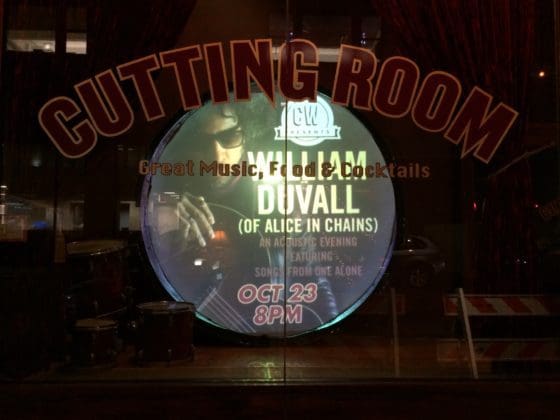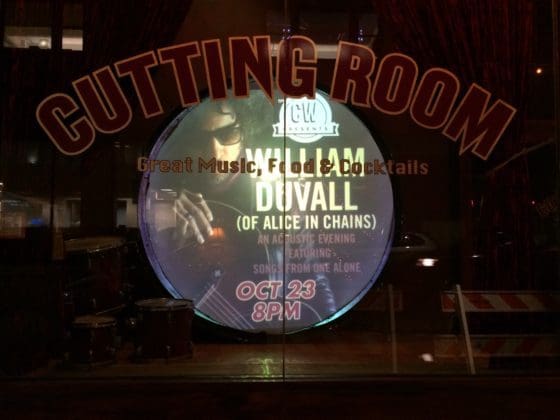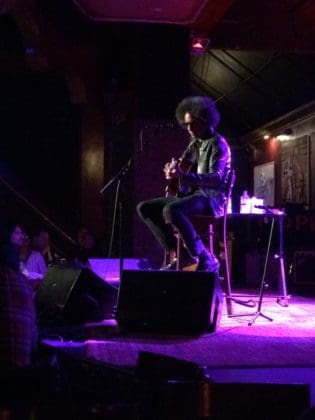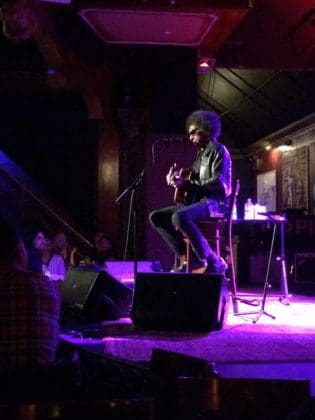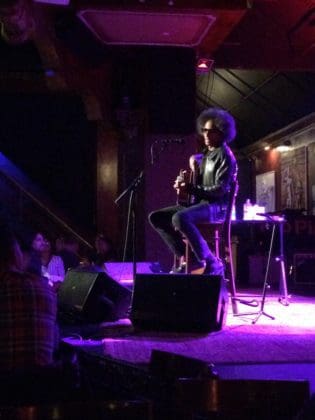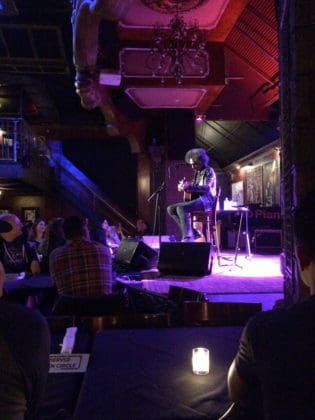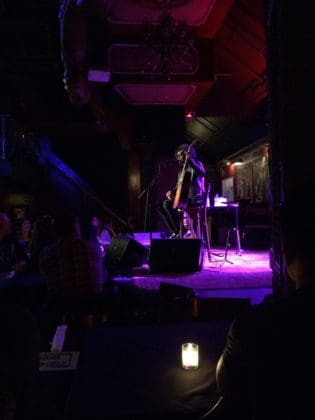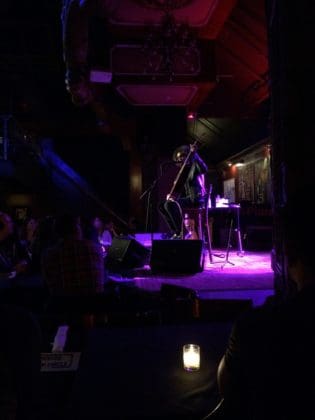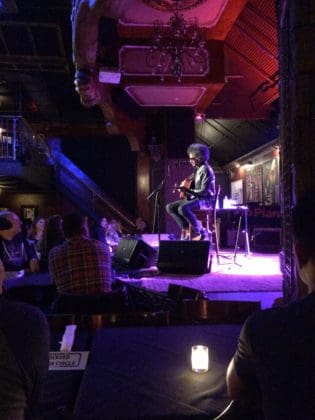Harkening back to a world prior to COVID-19, there once was a storybook worthy concert where a sold-out crowd gathered, near the midtown section of Manhattan, to witness William DuVall perform shortly after the release of his solo debut, One Alone. Those two words, “One Alone,” ring hollower than ever, as we all individually cope with the long-term, societal impact of this unprecedented global pandemic.
If there were ever one musician who personified a trailblazer mindset of hope and perseverance, even beyond a musician’s type of musician, who has thrived in a multitude of styles and settings, and someone who has overcome every possible obstacle in the book without ever losing sight of his path, this notion belongs to William DuVall.
To describe the overall atmosphere of this story on October 23, 2019, this was the ideal scenic night in New York City, as the weather was a bit warmer than usual, yet possessed enough brisk to signify the fall season. This show took place at The Cutting Room, a gorgeous club and restaurant located amidst an endless view of vintage buildings and glowing lights that define Manhattan. It was a packed house comprised of fans, friends, and industry personnel whose credentials have impacted the last 30 plus years of recorded music, including Susan Silver and David Fricke.
The stage lights were dimmed in purple, and this glowing yellow light shined on DuVall’s two acoustic guitars, which he later dubbed as, “Hummingbird 1 and 2.” From where I sat, I was able to catch William wave to a few fans and friends right before the concert began. The common theme of this entire show and why I mentioned this moment, he is truly an incredibly kind and genuine person, and this scene altogether – rock, grunge, and metal – is so fortunate to have someone with his immense heart leading the way, and carrying the torch for the past fifteen-plus years.
Rocking a black leather jacket and his trademark sunglasses, William DuVall walked up to the stage with the calmest demeanor, waved to the crowd, took a seat, picked up his guitar, and kicked straight into “The 3 Wishes.” This haunting guitar intro immediately echoed, as we collectively felt the emotive catharsis in his picking patterns, and when the latter half breakdown kicked in, the extended bends in his riffs could be felt right in the chest. The connective tissue displayed both here and throughout the entirety of this performance, DuVall bled his heart out into every single note, vocal melody, and chord progression.
The tone was set right from the start, as this was a complete encapsulation of William DuVall’s entire career. Based off his aura, he possessed the endless determination of an upcoming musician, especially as this was his very first solo acoustic tour.
Shortly after, DuVall mentioned how there were two songs off Alice In Chains’ 2018 LP, Rainier Fog, that had charted in the Top 10 of the “Mainstream Rock” charts. He joked around about Jerry Cantrell not being there to help him perform the next song, which just so happened to be “Never Fade.” This was an unbelievable moment and the crowd instantly erupted, as I don’t think most of us expected to hear an Alice In Chains song, let alone a modern classic in their repertoire that he co-wrote. He proceeded to amplify the adrenaline-infused tempo of this beloved single, and simultaneously added a completely new dimension packed with acoustic, unplugged grit.
Prior to Alice In Chains, DuVall fronted his longtime band Comes With The Fall. Throughout the night, he shared some heartwarming stories about their time together, and how their initial formation completely reignited his love for music. He also mentioned how their first album had been out-of-print for quite some time, and multiple songs that he re-recorded like “Smoke and Mirrors” could be heard on One Alone. His sense of humor was on-point when he added, “For those of you who don’t have One Alone, it’s conveniently on sale tonight.”
During his radio single (and fellow Comes With The Fall track) “White Hot,” the soothing grooves and grittiness within his riffs and vocals demonstrated such a distinct balance between heaviness and soul. Few songwriters embody such a versatile balance of raw emotions, especially as his vocal approach combined his aggressive power with the highest stratosphere of his range, and completely maximized the echo within this venue.
A pinnacle moment of this set occurred when DuVall asked, “Are there any Bowie fans out there tonight?” Storytelling played a huge role in establishing the warmth of this performance, and DuVall spoke about the magnitude of discovering Ziggy Stardust (The Rise and Fall of Ziggy Stardust and the Spiders from Mars) when he was young, and it was like David Bowie somehow understood the trials and tribulations of his upbringing, whether he knew it or not. In his own words, Bowie captured, “The alienation you walk with.” This next quote distinctly stood out when DuVall emphasized, “With One Alone, my highest aspiration for this record is for it to become a friend to somebody. A lot of records and songs have become friends to me, like how this Ziggy record became a friend to me.”
To capture the full spectrum of DuVall’s setlist, he performed “The Veil of All My Fears,” where the elegant minor chords painted such an intense portrait of self-confessional honesty. While explaining the initial genesis of this track, he made an excellent point about the personal and communal spirit of music, “This song could truly be for anyone.” The same compliment belongs to “Still Got A Hold of My Heart,” a prime showcase of the bravery that we most appreciate in musicians who embody such fearlessness to open up their wounds through lyrics, melodies, compositions, and in this case, the limitless, haunting power of DuVall’s voice throughout the second half of this performance.
Later in the show, DuVall revisited the ‘70s once again and covered an Aerosmith deep cut, “Seasons of Wither.” He stated, “I love early Aerosmith and this song is off their second album, which counts as vintage.” Cool enough, he explained how Steven Tyler wrote this song and its guitar riffs, even though Tyler isn’t a guitar player. And he quipped, “And you too, will be flabbergasted by how cool these riffs are.” As I’ve often mentioned William’s higher range, this interpretation spotlighted the depths of his lower range and spoke to the core of adding originality to a cover. Bouncing off his guitar point, these riffs sounded mean, unconventional, and extremely tough through his Gibson Hummingbird.
And this evening certainly possessed an easygoing sense of fun and back-and-forth with the audience, especially when those in attendance, particularly the fans who sat near the front, encouraged William to revisit Dionne Farris’ “I Know.” For those unfamiliar, DuVall co-produced and wrote this massive ‘90s hit with Milton Davis. He explained how this song changed his life forever and comedically joked that he only wanted to perform this song for his friends in Atlanta (This was a special, hometown show and the first date of the tour). However, the room instantly lit up once he kicked into the opening chords. The audience members joined in with clap-alongs and loudly helped sing the chorus. This moment represented one of many high points, as I could distinctly recall the gleaming eyes among those who sat near me, and this uplifting sense of nostalgia in the air.
Though I have alluded to this point, DuVall’s guitar playing is something special to behold, and he somehow plays some extremely complicated riffs, chords, finger picking patterns, and solos amid challenging vocal sections. Case in point, he tapped into the core of the blues during “So Cruel,” and simultaneously matched the vibrato in his guitar solo with a stunning melody of vocal scats. The accentuation of his bends cut so sharply; it was an awe-inspiring moment of melodic expression that deserves to be experienced by fellow guitarists and music lovers first-hand.
Towards the end of the night, DuVall shared a personal anecdote about one of his personal favorite tracks, “No Need to Wonder.” This song came to fruition during a crossroads moment in his career where he had to ask himself, “Where do I fit into the music industry?” And this composition allowed him to realize, intuitively, that he had something awesome in front of him and to keep fighting for his art. With a new canvass to paint his portraits alongside Comes With The Fall, these songs helped him rediscover a reinvigorated sense of clarity and eventual prosperity.
Shortly after “No Need to Wonder” began, I happened to write down how the following lyrics distinctly stood out, “Now may be the only time / We get to share the smallest part / Of the loneliness / That makes us who we are.” Perhaps more than ever, these very words speak to the core of the human consciousness, especially with this standstill moment in our society. Through global pandemics like COVID-19 and our own personal struggles, performances and songwriting of this caliber demonstrates how music is the art-form that will guide us through these turbulent times, as the shear innocence exemplified within this song, authentically captures the human element of life itself.
And to compliment this last point, DuVall closed this set with, “’Til The Light Guides Me Home.” Though this single and its accompanying music video were still relatively new at the time, it felt like a timeless, heralded classic in DuVall’s songbook, which speaks volumes about its compositional merit. This point is also worth mentioning, the entire room was noticeably hot for a handful of songs by this point and it might not have been the ideal temperature to perform in. However, over this bone-chilling portrait of string-plucked delicacy, William sang with the utmost sense of soul-searching, retrospective honesty, which served as the pinnacle encore to a masterpiece performance. The spirit between artist and audience reached such a mutual sense of appreciation, this type of momentum was in the highest echelon of what live music represents.
As this story concludes, I want readers to understand that William DuVall chose the independent route for One Alone and toured on a very small scale. Outside of Alice In Chains, DuVall has maximized the independent blueprint throughout his entire career, and COVID-19 has drastically impacted like-minded artists and contemporaries who also pursue a similar path. He recently performed an unplugged set through Facebook Live, and may readers seek it out and help contribute in the best way they can.
Look out for programs like MusicCares and similar campaigns that help workers behind the scenes – tour managers, merchandise managers, crew members, techs, publicists, and beyond. A major shoutout belongs to DuVall’s team and crew on this tour, Jamie, Scott, and Susie, who I happened to meet and converse with that night, and my gratitude goes out to the incredible people and workers like them who will continue to make touring a possibility once the world heals itself.
My last point, this goes out to Alice In Chains listeners and music fans in general, I highly encourage everyone to check out One Alone and catch this tour down the line. As evidenced by this story, someone will attend this show and of course, they will walk away having witnessed the absolute highest caliber of music, but more importantly, they will get to know who William DuVall is on a personal level and learn so much about his story. In my opinion, the most inspiring artists to root for are those like William DuVall who has never lost sight of his humble beginnings, and continues to share, teach, and embody the ethereal principles that will forever define a musician’s journey.


